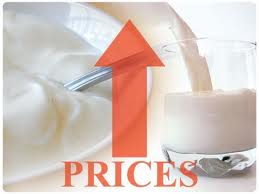When Retailers Should Raise Prices & How
When it comes to competitor pricing and profit, there's nothing better than the opportunity to raise your prices. First, how do you know when it's a great time to raise prices? Second, how do you raise prices without offending or losing current customers?
To start off, retailers should use pricing intelligence solutions and check competitor pricing every day. When you need to raise prices, do it very carefully and wisely.
The following are a few of the circumstances where it's advisable – even imperative – to raise your prices if you want to stay competitive and be profitable in today's market. Also, a few tips on how to raise prices without losing any customers.
When It's Time for Retailers to Raise Prices:

When you discover that you're charging less than your competitors.
That means there's room for you to charge more. Take, for example, a nice handbag in a specific brand. Your check of competitor pricing shows that they are charging fifty dollars more for the exact item. That's the time to raise your price on the item, be much more competitive, and make a lot more money than you would have, had you not known about your competitor's prices.
When your competitor is out of stock
Your competitive price monitoring reveals that the competitor had the item, but it is currently out of stock. That's the time to strike while the iron is hot; the product will be in demand and you will command the price to be paid.
Your pricing intelligence information keeps you aware of what's happening, and you can act in a timely and profitable fashion – likely to gain more customers for future sales from your "store."
When you are providing additional value and service
Service is the key. Customers are willing to pay more when they know the product and service is reliable, easy, efficient, and convenient. It even makes sense to sell fewer products, but make your service more valuable, and give yourself the time to give proper attention and follow-up to the buyer.
When you can market niche items
It is always more valuable to the consumer to find a specialized product or service desired by fewer people and harder to find. Nevertheless, there is a demand, and the customer is willing to pay more to acquire this item.
Examples include accessories to major items like smartphones, shoes in odd sizes, clothing in hard-to-find sizes, items that need special ordering or handling. You create a nice niche by being the retailer that can fulfill these needs.
When the customer isn't always looking for price first
A study of 5,000 consumers in the UK found that many ranked customer service first, product quality second, and pricing third. Listen to your customers to find out what is most important to them. Continue to track competitor price and assortment to get a sense of which elements are most important to your particular customers.
How Retailers Can Raise Prices Smartly:

1. Make sure the reason for raising your prices is justified and credible. Customers understand this, just don't surprise them. If supply prices have gone up, customers know that you have to charge more for the product or service.
2. Prepare your customers for a raise in prices. Be honest. Lay the groundwork in your regular communications with your customers, and start building your case for a price increase. This allows customers to get used to the idea before actually implementing a price raise.
3. Give existing customers a discount. Your customers will understand a price raise if you explain the reason well and are straightforward about it. But give the existing customers a discount so they know you value their business.
The higher price will be for new customers, while making your existing customers happy and understanding that you value them and their business.
4. When you raise prices, be sure you raise them high enough. And monitor the effect it has on sales. It is always easier to come down from a higher price than it is to raise it.
Be on the alert for opportunities to raise your prices. Use a pricing intelligence solution to notify you that your competition is charging a higher rate, or out of stock on an identical product are two great reasons. The use of pricing intelligence is vital so you have this critical information with which to make your pricing in real-time -- and so you can profit in a meaningful, timely, wise way.
 Written by
Written by